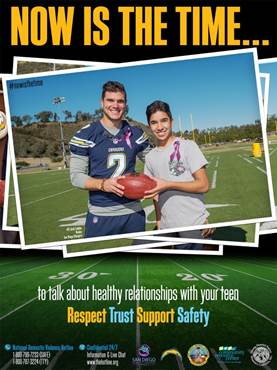 SAN DIEGO–A new outreach campaign was revealed Monday just in time for Valentine’s Day, aimed at educating youth and parents about teen relationship abuse. The campaign features the key message ‘Now is the Time’ to educate teens and the community about dating abuse.
SAN DIEGO–A new outreach campaign was revealed Monday just in time for Valentine’s Day, aimed at educating youth and parents about teen relationship abuse. The campaign features the key message ‘Now is the Time’ to educate teens and the community about dating abuse.
The campaign is being headed up by the San Diego Domestic Violence Council including support from local partners such as the San Diego District Attorney’s Office, Strong Hearted Native Women’s Coalition, Community Resource Center, the San Diego Chargers and other criminal justice and social service agencies.
The campaign includes six public service announcements that will air on multiple cable TV networks from February through July, including two spots that aired during the Super Bowl on ESPN Deportes. In addition, 6,000 posters in English and Spanish are being distributed to schools and other locations, encouraging teens to recognize both signs of healthy relationships and the warning signs of relationship abuse – letting them know where they can go for help if they find themselves in an abusive relationship.
“We know that it will ‘take a village’ to make a difference,” said Jessica Yaffa, the DV Council President, at today’s press conference. “This campaign is not just about educating our youth, it’s about getting the attention of parents, teachers, school boards, officials and community members to start a conversation about what healthy relationships should and can look like.”
Research shows young adult dating abuse is a big problem, affecting youth in every community across the nation. Nearly 1.5 million high school students nationwide experience physical abuse from a dating partner in a single year. According to the Centers for Disease Control, when it comes to adult victims of intimate partner violence and abuse, 22 percent of women and 15 percent of men first experienced some form of partner violence between the ages of 11 and 17-years old.
In 2015, there were 73 cases involving domestic violence within teen relationships referred to the DA’s Office for prosecution. The referrals represent cases where the victim reported the abuse, but unfortunately that is not always the case.
“Violent relationships can have long-lasting effects on teens,” said San Diego County District Attorney Bonnie Dumanis. “Adolescent victims of violent relationships are at greater risk for substance abuse, mental health problems and further domestic violence. Now is the time for parents to talk to their teens about healthy relationships and know the signs of teen relationship violence so they can help their teen get out of an unhealthy relationship before it’s too late.”
Jessica first experienced teen dating violence when she was just 16-years-old. She wishes that her parents had known how to recognize the warning signs in order to intervene earlier. “I was confused and thought I could handle the situation on my own. I didn’t want my parents to know what I was going through. That has to change. We need to bring this issue to the forefront where parents and teens alike can feel comfortable talking about these issues and know how to access resources together.”
The campaign was funded by the San Diego County District Attorney’s Office, Strong Hearted Native Women’s Coalition and the San Diego Chargers.
“Tribal communities have the highest rates of abuse than any other ethnic group, which makes this campaign so important,” said Keely Linton with Strong Hearted Native Women’s Coalition. “To prevent future abuse it is imperative to educate our youth and begin the conversation about healthy relationships earlier.”
The goal of the campaign is to raise awareness about teen relationship violence among teens and parents, so they can talk to their children about healthy relationships. According to a survey conducted by Teen Research Unlimited in 2009, though 82 percent of parents feel confident that they could recognize the signs if their child was experiencing dating abuse, 58 percent conceded could not correctly identify all the warning signs of abuse.
Warning signs of teen relationship violence for parents to know include the following:
· Unexplained bruises or marks
· Your child’s partner texts or emails excessively
· Your child is depressed, anxious or using substances
· Your child stops spending time with friends or family
· Your child’s partner is jealous or possessive
· Your child suddenly starts dressing differently
· Sudden decline in school performance
· Your child stops participating in hobbies, sports, or other areas of outside interest
The Public Service Announcements and posters feature Chargers outside linebacker Jerry Attaochu and kicker Josh Lambo, along with links and phone numbers to important resources.
“I’m just glad to be a part of the important conversation about healthy dating for teens,” said Lambo. “If we can help get this conversation started in homes and schools, or inspire teens to learn the signs, we’ve done our jobs.”
If you or someone you know is a victim of domestic violence, don’t hesitate to call or contact the following resources to get help:
· National Domestic Violence Hotline, 1−800−799−7233 (24/7/365) Confidential, www.thehotline.org
· Love is Respect (peer-led hotline) 1-866-331-9474 (24/7/365), Confidential, LoveIsRespect.org
· San Diego Domestic Violence Council www.sddvc.org





